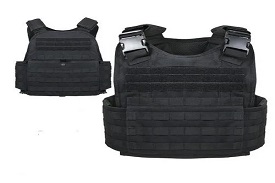
Bullet-resistant jackets, also known as bulletproof vests or ballistic vests, are protective garments designed to provide defence against firearm projectiles and other ballistic threats. These jackets are constructed using multiple layers of specialized fibres, such as Kevlar, Twaron, Dyneema, or Spectra, which are tightly woven or laminated together to form a strong and flexible ballistic barrier. The design and composition of bullet-resistant jackets vary depending on the level of protection required, with higher levels capable of stopping more powerful ammunition. These vests are commonly worn by law enforcement officers, military personnel, security guards, and individuals in high-risk professions to mitigate the risk of injury or death from gunfire and ballistic attacks. While bullet-resistant jackets are highly effective at stopping or slowing down bullets, they do not provide absolute protection and may still cause injury from blunt force trauma or high-velocity impacts. Advancements in materials and technology continue to improve the performance and comfort of bullet-resistant jackets, ensuring reliable protection for those in harm's way.
IS 17051:2018 is a critical standard for bullet-resistant jackets, ensuring their quality, reliability, and effectiveness in providing protection to individuals in high-risk environments. This standard lays down comprehensive guidelines and specifications for manufacturers, covering essential aspects such as material strength, ballistic resistance levels, comfort, and ergonomic design features. By setting clear parameters for factors like ballistic resistance testing methods, energy absorption capabilities, and overall construction quality, IS 17051:2018 ensures that bullet-resistant jackets meet stringent standards for consistency and reliability in safeguarding against ballistic threats. Compliance with this standard instils confidence among users and enhances their safety and security in law enforcement, military, and security applications. Adherence to IS 17051:2018 promotes regulatory compliance and contributes to the overall effectiveness and reliability of bullet-resistant jackets by ensuring standardized production practices and facilitating market acceptance.
Note: Obtaining the ISI/BIS Certification is a mandatory requirement for manufacturers of bullet-resistant jackets to sell their products in the Indian market.
It is mandatory for manufacturers to obtain ISI/BIS certification for their bullet-resistant jackets in order to market and sell these products legally within India. This certification serves as a crucial indicator of compliance with specific quality and safety standards mandated by the BIS for the production and distribution of bullet-resistant protective gear. Without the ISI/BIS certification, manufacturers risk facing legal repercussions and barriers to accessing the Indian market. Therefore, obtaining this certification is a vital step for manufacturers to demonstrate the reliability, compliance, and effectiveness of their bullet-resistant jackets. This certification process underscores the importance of ensuring the integrity and safety of such protective gear, instilling confidence among stakeholders in the security industry regarding its suitability and adherence to Indian standards for usage and distribution.
Indian Standards Institute, or ISI was renamed the Bureau of Indian Standards (BIS) in 1987. The official mark that the Bureau of Indian Standards provides for manufacturers of various goods is the ISI Mark. It is used to indicate compliance with Indian standards (IS) set by the Bureau of Indian Standards (BIS) and has been used as a conformity marking for industrial products. Manufacturers received permission from BIS to use the ISI Mark on items that comply with relevant Indian requirements through the product certification program.
Only manufacturers (domestic or foreign) who produce the finished product will be awarded ISI Certification. This will not be given to any product importers, traders, dealers, or distributors.
The following documentation is required to get an ISI certification:
For more detailed information, please click here.
There are two approaches for Indian manufacturers to become certified with the ISI Mark:
Regular Procedure
With the possible exception of cases deemed "All India first," which might take up to 180 days, the licensing procedure is expected to be finished in 120 days. This timeline starts on the day the application is received, assuming that at different points in time the documentation, unit assessment, and product conformance are all deemed acceptable.
Step 1: Manufacturing Unit Customization in Compliance with Applicable Indian Standards
Step 2: Submission of the Application Form
For more detailed information, please click here.
Simplified Procedure
This is a much faster process than the standard procedure. After a factory inspection is deemed satisfactory and the initial evaluation establishes that the sample complies with the applicable Indian Standard(s), the license application process is expected to be finished in 30 days.
Step 1: Adapting the Manufacturing Unit to Comply with the Relevant Indian Standard
Step 2: Sample Testing
For more detailed information, please click here
The process of obtaining ISI Mark Certification for Foreign Manufacturers typically includes the following steps:
Step 1: Application
Step 2: Query Raised (If Any)
For more detailed information, please click here.
Brand Liaison provides helpful support for achieving ISI Mark Certification. Among our offerings are:
Please click here to get in contact with our team of specialists for a deeper explanation of the paperwork and steps needed to get ISI Mark Certification.